Articles from the Thoroton Society Newsletter
A notice from Collingham and District Local History Society: Bealby, Blacksmith and Ploughmaker of North Collingham
By Jeremy Lodge
This notice consists of two parts. Firstly, to highlight that the Society has digitised a number of account books from the above that are available to be used as a research resource. And secondly, communications that we have had concerning several items from the above.
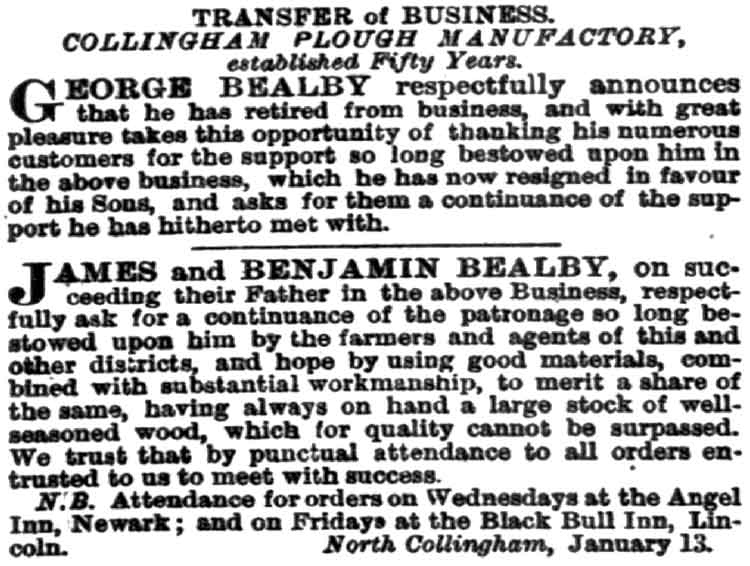 Stamford Mercury 27th January 1871.
Stamford Mercury 27th January 1871. We have in our possession two and have been loaned four further account books for Bealby Ploughmakers of North Collingham. These are ‘Day Books’ which show work done for clients on a day-by-day basis, complete with the sums charged. These include for example the costs of ploughs also of individual parts sold, usually plough shares, which the customer would have fitted themselves. There are also books which show similar information which are arranged by client.
These books show the vast number of customers in Nottinghamshire and Lincolnshire and gives an indication of the number of local smallholders, many of whom are known locally for their other businesses and their community roles.
George Bealby started his plough making business in 1821, handing it over to his sons James and Benjamin in 1871. On its books are details of repeat customers not only from across and just beyond Nottinghamshire and North and Central Lincolnshire as far as Gainsborough (19 miles)1, Mansfield (25m), and Doncaster (38m) and Brigg (39m), as one may reasonably expect. They also had many repeat customers from further afield, for example; Matlock Bridge (42m), Sheffield (56m), Barnsley (56m), Beverley (84m), Kings' Lynn (75m) and Chepstow (160m). Collingham had a railway station from 1846, which would have aided servicing such a geographically wide clientele and indeed one entry for May 19th 1891 includes ‘deducting 10 shares lost on Ry 2s 9d’.

'Deducting 10 shares lost on Ry 2s 9d', 1891.
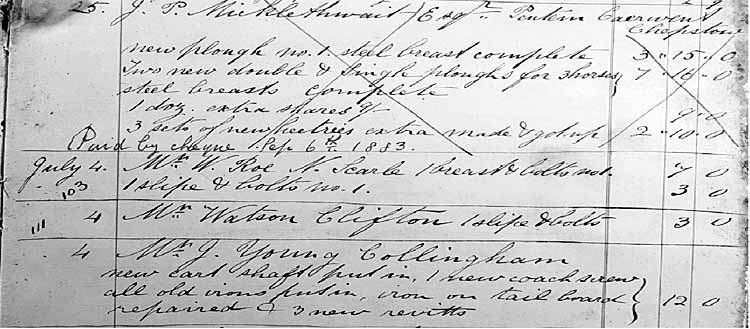 Extract from Day Book, 1883. Clifton and North Scarle are nearby villages.
Extract from Day Book, 1883. Clifton and North Scarle are nearby villages.Some of the entries show that they had trouble with debtors, such as one entry which shows Messrs Hydes and Wigfall of 88, Market Place, Sheffield going into liquidation and the resultant dividend that Bealby received. Hydes and Wigfall appear to have survived as they continued to be a Bealby customer.
Other debtors were just recalcitrant in paying and had to be taken to court including George Crossley, Engineer and Millwright of Doncaster in 1881 and 1882.
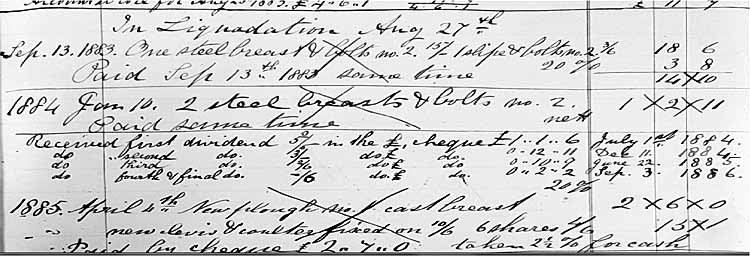 Liquidation entry for Messrs Hyde & Wigfall of Sheffield, 1884.
Liquidation entry for Messrs Hyde & Wigfall of Sheffield, 1884.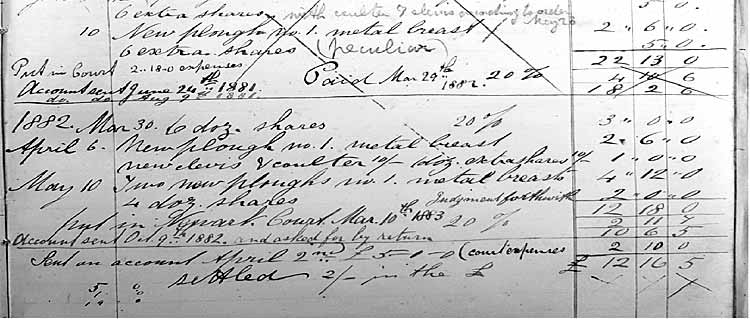 Customer Book extract for George Crossley, 1881 & 1882, showing Bealby's court expenses.
Customer Book extract for George Crossley, 1881 & 1882, showing Bealby's court expenses.Much more is shown such as payments being made by cheque and Post Office Order, also there is a regular note of 2½% discount for cash. There is a wealth of information here that would be worthy of analysis at various levels by amateur and student historians, perhaps even for a Master’s dissertation or similar. These books would also be of use for local, family and agricultural historians and those searching for individuals. Dr Dennis Mills used a Bealby Account book for an Open University module on Historical Geography in 1983 (unfortunately the book for 1871 to 1882 that he used, although it is referenced to Lincolnshire Archives and the Bealby family, is missing). The data that we have concerning the business is incomplete as there are often notes that carriage has been paid, but thus far no carriage costs are consistently obvious, neither are costs such as raw materials and salaries &c. I would have thought that details of expenditure would have been kept somewhere as between 1871 and 1873 this business was a partnership between two brothers, James and Benjamin. So, what we have appears to be a partially complete set of customer focussed ‘financial working documents’.
The documents that we do have exist as individual jpeg files sorted in the order that they occurred in the original books. They amount to some 2,000 images, totalling some 8Gb in size. Being hand written by various hands they are not electronically searchable. Those books, from which some of these images originate, that remain in our archives are too fragile to be handled. The business premises in North Collingham which George Bealby built in 1858 remain within the family and are currently the home of Collingham’s Cat Asylum Brewery.
Adjoining South Collingham was also the home of a successful plough making business which belonged to George Moss, unfortunately although the site of his business premises was recently redeveloped, we know very little of George Moss and his ploughs. Four of the account books we have been given permission to photograph and publish belong to Alan Bealby from West Sussex, who also has in his possession two 120-year-old wooden beam ploughs, a 130-year-old forest cart and a range of tools from this company that his great, great, great grandfather founded. Alan is looking for a permanent home for these items, preferably as a gift to a not-for-profit organisation who can put them on open display.
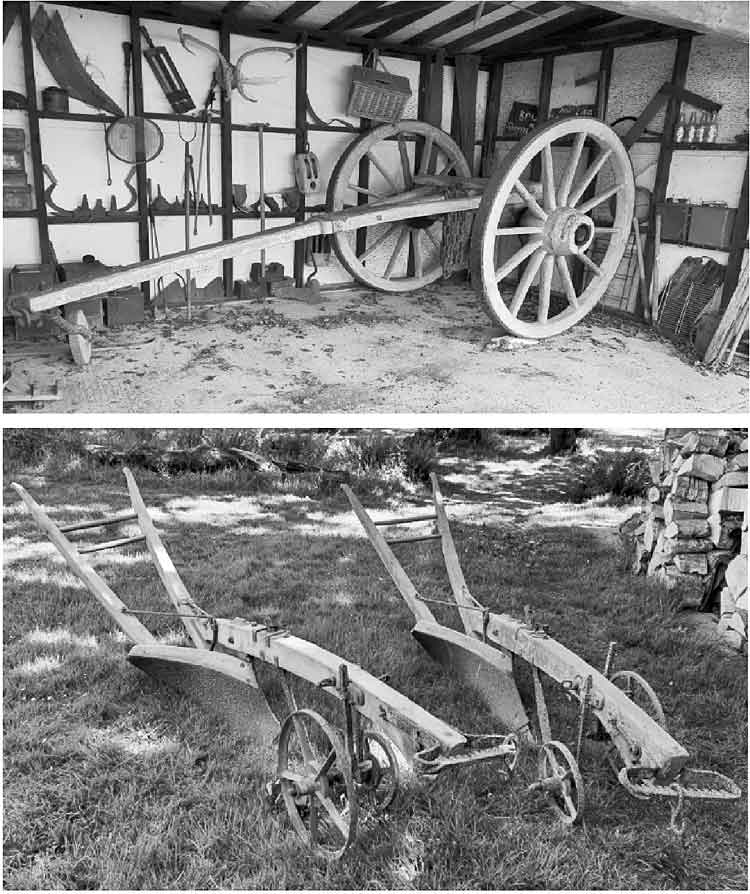
Unfortunately, although we have contacts who may undertake the light renovation work required for some of the items, our Society does not have the facility to either store or exhibit them. Alan Bealby has approached a number of people who we have suggested without success and has been left with the feeling that Nottinghamshire does not care for its agricultural heritage.2
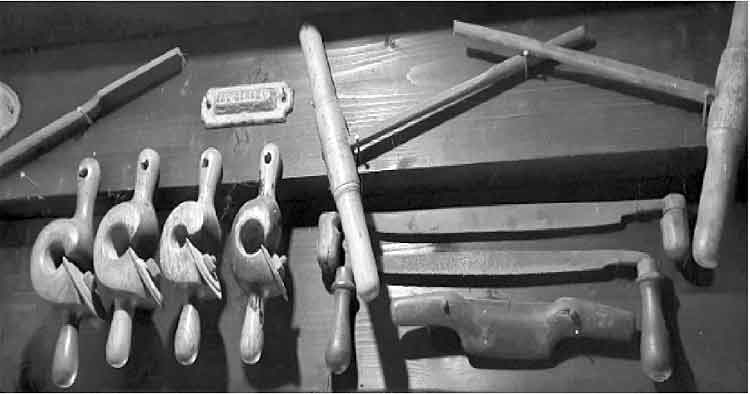
If you are interested in accessing these files for analysis please contact Jeremy Lodge through our web page at http://collingham-history.org.uk/contact-us/ All that we ask is to be fully credited in your references and for a copy of the results of your analysis and reports that we can place in our archives and for permission to publish an abstract of your findings in our journal The Irregular. Or perhaps, you may have something that would supplement our knowledge of this business and plough making?
Jeremy Lodge (Trustee, Collingham and District Local History Society)
1. Modern mileage using AA.com, Beverley mileage avoids the Humber Bridge.
2. Including; Newark and Sherwood District Council National Civil War Centre and Newark Museum, Lincolnshire County Council Museum of Rural Life. Nottingham City Council Museum Service & Wollaton Hall, Nottingham. Nottinghamshire County Council.
< Previous